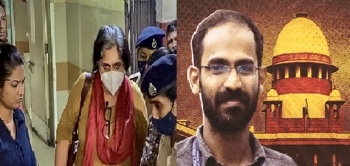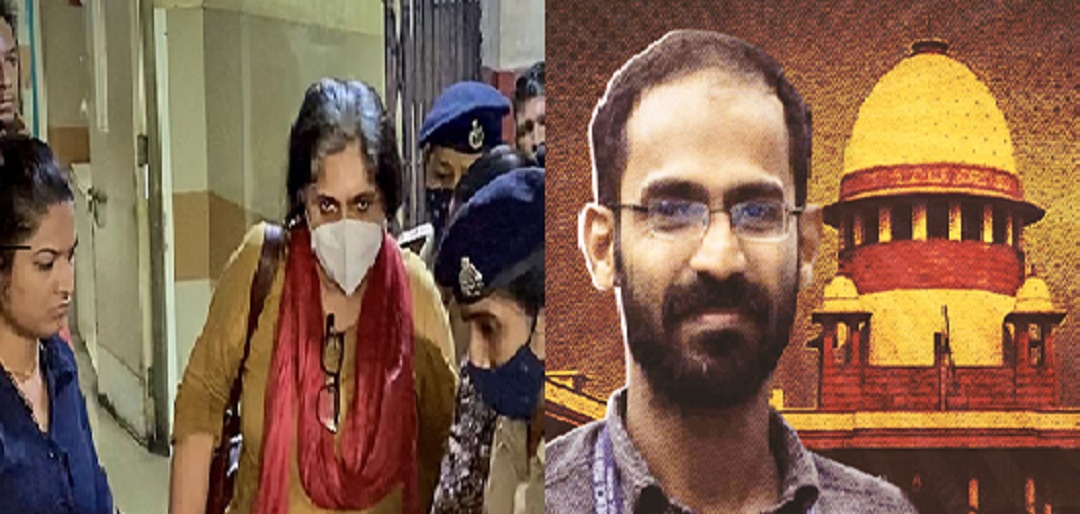
.png) Cedric Prakash
Cedric Prakash

Two high-profile pleas for bail came up for hearing recently in the Supreme Court: one was from Teesta Setalvad and the other from Siddique Kappan. Both hearings were presided over by the Chief Justice of India, U. U. Lalit.
On Friday, September 2, a three-member Bench of the Supreme Court granted interim bail to Teesta Setalvad who was accused by the Gujarat Police for fabricating documents to apparently implicate some government functionaries in the Gujarat Carnage of 2002. It is an undisputable fact that Teesta worked relentlessly and selflessly to bring justice to the victim-survivors of that carnage.
On June 25, Teesta was taken into custody from her residence in Mumbai by the Gujarat Police and brought by road to Ahmedabad. She was later charged with criminal conspiracy, forgery and other Sections of the IPC on the basis of an FIR. On July 30, Setalvad was denied bail by an Ahmedabad judge. She later appealed to the Gujarat High Court which posted her appeal for hearing on September 19. She moved the Apex Court against the Ahmedabad court’s order and the Gujarat High Court’s decision to give “an extremely long date in a matter which is about personal liberty”.
Teesta was incarcerated for 70 days (seven in police custody and 63 days in the Sabarmati Central Prison in Ahmedabad). The order which gave her the interim bail states, “we are presently considering the matter only from the standpoint whether during the pendency of such application, custody of the appellant can be insisted upon or whether she can be granted the relief of interim bail. Having considered the circumstances on record, in our view, the High Court ought to have considered the prayer for release of the appellant on interim bail during the pendency of the matter. The essential ingredients of the investigation including the custodial interrogation having been completed, the relief of interim bail till the matter was considered by the High Court was certainly made out.” Teesta’s application for regular bail will come up for hearing on September 19 in the Gujarat High Court.
On September 9, Kerala journalist Siddique Kappan was also granted bail by the Supreme Court. Kappan was arrested in October 2020 and has been languishing in jail ever since that time: 23 months! He was arrested while on his way from Delhi, to report from Uttar Pradesh’s Hathras, where a Dalit teenager was gang-raped by ‘upper’ caste men; the girl died later. Kappan was booked under Sections 124A (sedition), 153A (for promoting enmity between groups) and 295A (outraging religious feelings) of the Indian Penal Code, Sections 14 and 17 of Unlawful Activities (Prevention) Act, Sections 65, 72 and 76 of the Information Technology Act.
While granting Kappan bail, the Supreme Court said, “Every person has a right to free ex
However, though Kappan was granted bail in the UAPA case, he will remain in jail since he is yet to get bail in a case under the Prevention of Money Laundering Act filed by the Directorate of Enforcement against him.
Earlier, in August, a division bench of the Allahabad High Court granted bail to Mohammad Alam, a cab driver from Delhi, who was arrested along with Kappan stating, “on the basis of material available on record up to this stage, there appears no reasonable ground for believing that the accusation against the appellant are prima facie, true. Prima facie, there appears no complicity and involvement of the appellant with the terrorist activities or any other activity against the nation.”
“Bail, not jail!” has not only been a dictum but a guiding principle of ‘justice for all’. It was the well-known Supreme Court Judge V.R. Krishna Iyer who in 1977 penned those famous words while granting bail in a two-page order to a 27-year-old man from Rajasthan. Little did Justice Krishna Iyer know that he had penned down twelve immortal words which would go on to become a landmark principle of criminal jurisprudence in India. He said, “the basic rule may perhaps be tersely put as bail, not jail” This has since then been popularly paraphrased as the rule of “bail, not jail”. Interestingly the Citizen’s Tribunal which Teesta Setalvad laboured so much for in the pursuit of justice for the victims of the 2002 Gujarat Carnage, was headed by none other than the same Justice V.R. Krishna Iyer!
Granting of bail, therefore, is fundamental for justice. The denial to grant bail deprives individuals of liberty by confining them in jails without trial and conviction. The power to grant bail is a discretionary power vested in judges and it is meant to be exercised liberally. The Supreme Court has consistently reiterated the dictum popularised by Justice Iyer that, “bail is the rule, jail is an exception”. The primary purpose of bail is to ensure the accused person’s compliance with investigation, and subsequent presence at the trial if they are released after arrest.
At present, the power to grant bail is exercised sparingly and very selectively. Subordinate courts routinely reject bail for specific offences like minor excise offences. It is pertinent to note that a majority of those arrested under excise laws belong to marginalised and minority communities. Without grant of bail by the lower courts, the accused persons are required to approach the High Court or the Supreme Court. Consequently, most accused persons remain incarcerated as undertrials for extended periods of time. Two-thirds of India’s prison population comprise undertrials from Dalit, Adivasi and Other Backward Classes communities, often accused of minor offences.
The India Justice Report 2022, released recently, observes that eight out of ten prisoners across India were awaiting trial in 2021; out of the 5.54 lakh prisoners in India, 77% or 4.27 lakh were undertrials. “Delhi’s prisons house 91% undertrials, i.e., 9 out of 10 prisoners await completion of their trial.” The Report added that 24,033 undertrials have been in jails for three to five years, while 11,490 have been confined for over five years. Uttar Pradesh and Maharashtra had the highest number in this context. Out of the total undertrials in the country, 21.08% belonged to Scheduled Caste, 9.88% to Scheduled Tribes and 18% were Muslims. A pathetic state of affairs!
Most of those languishing in jails are from the poorer and vulnerable sections of society: this is for the simple reason that they do not have the resources to ensure that they get justice. There are also very arbitrary and discriminatory practices in the granting of bail.
While a Nupur Sharma and an Arnab Goswami can easily get bail with the Courts speaking about their ‘personal liberty’, the same yardstick is not applied to thousands of others; these include those who take on the Government, human rights defenders, journalists who expose the malaise in the system by taking on the powerful. There is the classic Bhima Koregaon conspiracy case: Sudha Bharadwaj and Varavara Rao are out on bail after many years of incarceration; twelve others are still languishing in prisons for years now. In July 2021, Fr Stan Swamy died while still in custody -- his death is regarded as an institutional murder.
Justice Dhananjaya Y Chandrachud of the Supreme Court will take over as the next CJI in less than a couple of months from now. On July 20, he headed the Bench, which granted bail to Alt News co-founder Mohammed Zubair after his incarceration for almost a month in connection with a spate of criminal cases lodged against the fact-checker over his old tweets. Justice Chandrachud wrote in the order that he had regretted that Zubair got “trapped in a vicious cycle of the criminal process where the process has itself become the punishment,” and added that individuals must not be punished solely on the basis of allegations and without a fair trial.
Ten days later on July 30, Justice Chandrachud addressed 1,200 officers from district judiciaries at the first all-India district legal services authorities meet. He exhorted the officers to stick to the principle of “bail, not jail” as a cardinal rule for the criminal justice system.
Emphasising that “deprivation of liberty for even a single day, is a day too many,” Justice Chandrachud urged judges to expedite hearings of bail pleas and improve the quality of justice being dispensed. He pointed out that it has become one of the most potent criticisms of the judiciary and its track record in upholding constitutional principles of liberty. He went on to add: “The oft-cited rule ‘bail, not jail’ is one of the most fundamental rules of the criminal justice system. Yet, in practice, the number of undertrials languishing in prisons in India reflects a paradoxical situation. Deprivation of liberty for even a single day, is a day too many...the judiciary’s commitment to the constitutional promise of personal liberty has to be bolstered in two significant ways — first, by addressing the quantitative delay in disposing of criminal matters, particularly bail petitions; and second, by improving the quality of justice that is dispensed by courts…What is the value of the rich jurisprudence developed by the Supreme Court since the independence of our nation to preserve and protect the liberty of each individual, if that does not come to the aid of the individual at the grass-root level? There is also a brooding sense of fear among courts of the first instance on how the grant of anticipatory bail or bail will be perceived at higher levels. This results in either rejection of bail or grant of bail on extremely onerous conditions — both of which, are undesirable outcome.”
These challenging and visionary statements are bound to re-echo when he presides over the Apex Court shortly. It is left, however, to be seen if he is able to translate these lofty words into substantial action -- particularly in the lower courts. Until justice becomes a reality, citizens of India should leave no stone unturned to ensure that. The recent bails given to Teesta and Siddique are pointers in the right direction. We must ensure that bail is given to many more -- particularly those who have had the courage to stand up to a fascist regime -- only then we will be able to prevent our nation from turning entirely into a police state.
(The writer is a human right, reconciliation & peace activist/writer. cedricprakash@gmail.com)